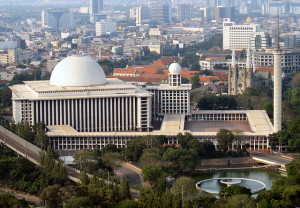Indonesia – A Model for Moderate Islam?
With a population of more than 200 million Muslims, the world’s largest, and a track record of relatively moderate Islamic influence, Indonesia has often been scrutinized by pundits looking for a “model” for moderate Islam. While Indonesian President Joko Widodo appears to have demonstrated his commitment to more tolerant, inclusive, and even traditional form of Islam, Indonesian society and the state as a whole face considerable conservative pushback. On August 1 and 3, President Widodo attended the openings of the Indonesia’s two largest Islamic organisations, Nadlatu Ulama and Muhammadiyah, respectively, calling on both to continue their brand of moderate Islam. Speaking at Muhammadiyah’s 47th Congress, whose theme was “Progressive Islam,” he described “Progressive Islam” as part of a “renewal process” in which one was to understand a religion which was rational, open, and civilized. His visits to the openings of both organisations follow an announcement by Mr. Widodo in June earlier this year that his administration would work more closely with moderate Muslim groups to promote a moderate brand of Islam in order to combat radicalisation.
Conservative Influences
 Despite Indonesia’s reputation as a champion of moderate Islam and Muslim opposition to Indonesia becoming an Islamic state, there remains significant pushback against moving away from a more conservative interpretation of Islam. In February this year, the Indonesian Ulema Council (MUI), Indonesia’s top clerical body, held the sixth Congress of Indonesian Muslims. At the end of the session, the Congress announced seven recommendations, among which were calls for the development of a Sharia-based economy and for government and society to be “on the alert and keep oneself away from cultures incompatible with Islamic sharia and the nation’s noble culture.” Amidst this expression of conservatism in Islam, Nahdlatul Ulama and Muhammadiyah managed to play only minor roles, demonstrating the dominance of conservative voices in the Congress.
Despite Indonesia’s reputation as a champion of moderate Islam and Muslim opposition to Indonesia becoming an Islamic state, there remains significant pushback against moving away from a more conservative interpretation of Islam. In February this year, the Indonesian Ulema Council (MUI), Indonesia’s top clerical body, held the sixth Congress of Indonesian Muslims. At the end of the session, the Congress announced seven recommendations, among which were calls for the development of a Sharia-based economy and for government and society to be “on the alert and keep oneself away from cultures incompatible with Islamic sharia and the nation’s noble culture.” Amidst this expression of conservatism in Islam, Nahdlatul Ulama and Muhammadiyah managed to play only minor roles, demonstrating the dominance of conservative voices in the Congress.
In spite of Indonesia’s moderate tendencies, a 2012 cross-national study published by the Pew Research Center indicated that Indonesia was one of the world’s most religiously restrictive states. In 2013, the Sertara Institute recorded 220 cases of violence against religious minorities by Islamic militant groups. While it might be tempting to emulate Indonesia monolithically as a model of moderate Islam, underlying tensions between moderate and conservative elements within Islam remain unresolved.
